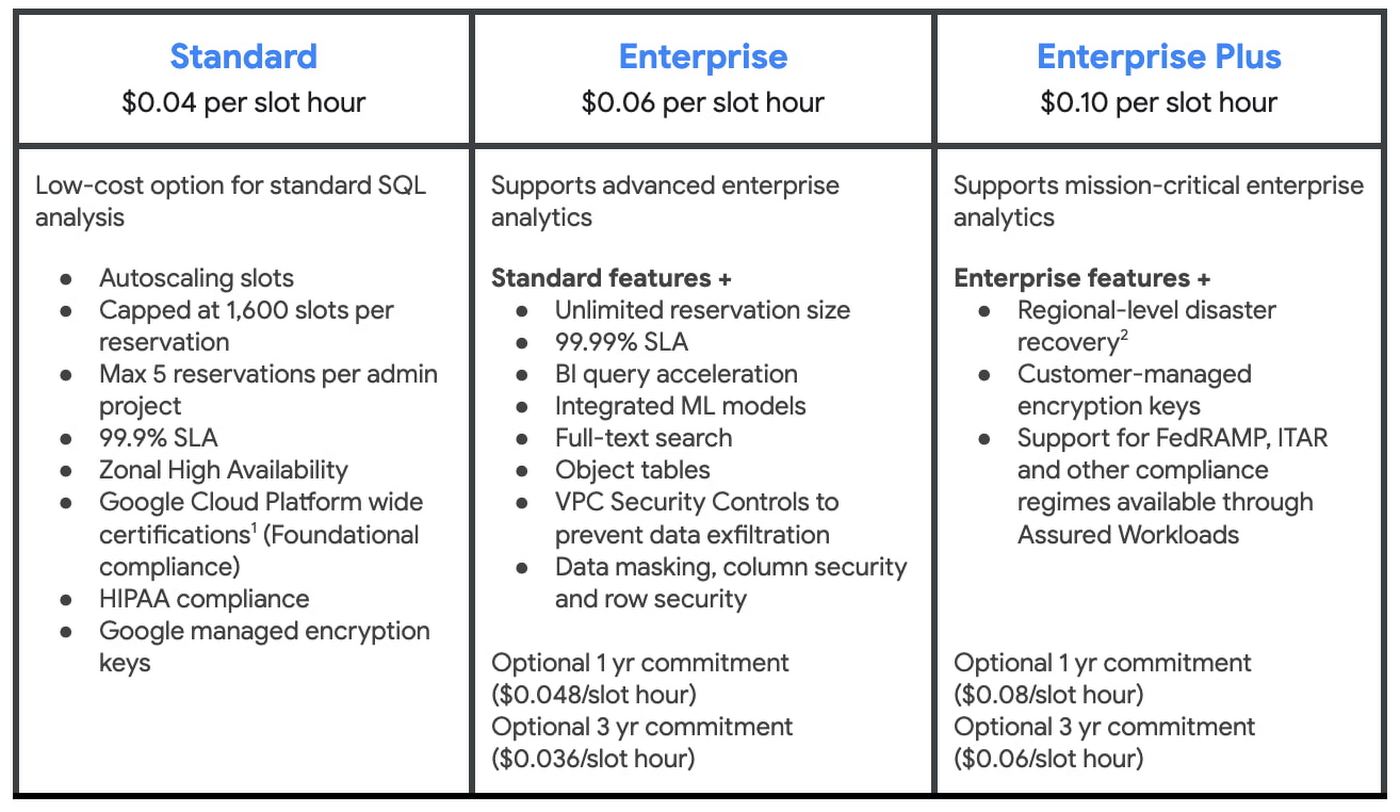GCP
New BigQuery editions: flexibility and predictability for your data cloud
Google Cloud has just announced the release of new BigQuery editions, featuring three pricing tiers — Standard, Enterprise, and Enterprise Plus — allowing you to select the most suitable price-performance option for your specific workload needs.
These BigQuery editions bring two key innovations. Firstly, Google Cloud introduces compute capacity autoscaling, which allocates fine-grained compute resources in real-time according to your workload demands, ensuring that you only pay for the compute capacity you use. Secondly, compressed storage pricing enables you to pay for data storage only after it has been significantly compressed, reducing storage costs while increasing your data footprint.
Over the past decade, continuous innovation and collaboration with customers have helped shape BigQuery into one of the market’s most unified, open, secure, and intelligent data analytics platforms, making it a central component of your data cloud. Its unique capabilities include BigQuery ML for machine learning through SQL, BigQuery Omni for cross-cloud analytics, BigLake for unifying data warehouses and lakes, support for analyzing all types of data, an integrated experience for Apache Spark, and much more.
Enhanced flexibility for optimizing data workloads with better price-performance balance
Starting on July 5, 2023, Google will:
- no longer offer flat-rate annual, flat-rate monthly, and flex slot commitments
- begin the migration of existing flat-rate and flex slots to the new BigQuery editions
- increase the on-demand pricing model by 25% across all regions
The new flexible pricing options, the ability to mix and match editions, and multi-year usage discounts will allow BigQuery customers to achieve improved predictability and a lower total cost of ownership.
In addition, with BigQuery’s new granular autoscaling, it is estimated that customers can reduce their current committed capacity by 30–40%. Read the BigQuery cost optimization guide to learn more.

BigQuery editions enable you to select the most appropriate feature set for your individual workload requirements. For instance, the Standard Edition is ideal for ad-hoc, development, and test workloads, while the Enterprise Edition offers enhanced security, governance, machine learning, and data management features. Enterprise Plus targets mission-critical workloads with high uptime, availability and recovery requirements, or those with complex regulatory needs.
What edition should I use?
In the ever-changing world of cloud technology, the answer often varies. To make things easier, let's explore a few fundamental questions to help you determine the most suitable version.
First, ask yourself whether your workload's compute needs to be executed in more than one zone. If the answer is yes, you can rule out the Standard Edition since it is limited to a single zone. Keep in mind this applies to the compute part of your workload, not storage.
Next, consider whether your workload requires over 1,600 slots. If so, the Standard Edition is also not suitable. Google has indicated that the 1,600 slot limit is strict and won't allow the same flexibility as their current on-demand 2,000 query slots.
Another question to ponder is whether you'll be utilizing BigQuery ML in any of your workloads. If that's the case, you'll need at least the Enterprise Edition, as it is the minimum version supporting this feature.
Additional factors to take into account include whether you frequently encounter the 100 concurrent query limit. If this is a recurring issue, it's worth considering the Enterprise Edition, which has removed that constraint.
An increasingly common requirement is managing your encryption key. In this case, you'll need the Enterprise Plus Edition.
Remember that each project can have either on-demand or a different version assigned. This enables users to optimize usage and expenses on a per-project or per-reservation basis. For Revolgy clients, feel free to contact the Support Team by opening a ticket, and they can assist with a call or usage analysis.
Edition Commitments
BigQuery Editions continue the practice of offering commitments for a specified term in exchange for reduced pricing. These commitments involve a fixed number of dedicated slots that are paid for round-the-clock but at a more affordable rate. In terms of billing, this arrangement resembles having a set Baseline Slots value that you pay for each month until the term ends, except at a lower rate.
Keep in mind that the advantage of committed slots in Editions is obtaining a less expensive set of slots dedicated to your reservation for continuous use. Slots that aren't in constant use shouldn't be committed, as you'll be paying for unused resources. Committed slots are guaranteed to be available.
Unlike flat-rate plans, which allowed for monthly or yearly commitments, Editions commitments are exclusively annual.
Similar to the previous flat-rate commitments based on multiples of 100 slots, the new commitments also follow multiples of 100 slot/hours.
One limitation is that these commitments only apply to the Enterprise and Enterprise Plus editions.
Pay only for what you use
BigQuery autoscaler efficiently manages compute capacity for you, allowing you to set up maximum and optional baseline compute capacity, while BigQuery automatically provisions and optimizes compute capacity based on usage, eliminating the need for manual intervention. This ensures sufficient capacity while reducing management overhead and underutilized capacity.
In contrast to alternative VM-based solutions that charge for a full warehouse with pre-provisioned, fixed capacity, BigQuery leverages serverless architecture to provision additional capacity in increments of slots with per-second billing, so you only pay for what you use.
The compressed storage billing model allows you to manage the complexity across all data types while keeping costs low. Compressed storage in BigQuery is based on years of innovation in storage optimization, columnar compression, and compaction.
Next steps for BigQuery customers
Starting on July 5, 2023, BigQuery customers will no longer be able to purchase flat-rate annual, flat-rate monthly, and flex slot commitments. Customers already leveraging existing flat-rate pricing can begin migrating their flat and flex capacity to the right edition based on their business requirements, with options to move to edition tiers as their needs change.
Considering BigQuery’s serverless functionality, query performance, and capability improvements, Google is increasing the price of the on-demand analysis model by 25% across all regions, starting on July 5, 2023.
Irrespective of which pricing model you choose, combining these innovations with multi-year commitment usage discounts can help you lower your total cost of ownership. Refer to the latest BigQuery cost optimization guide to learn more.
Customers will receive more information about the changes coming to BigQuery’s commercial model through a Mandatory Service Announcement email. In the meantime, check out the FAQs, pricing information, and product documentation.
Do you have any questions? Contact us, we are happy to help you with new pricing and optimization.

